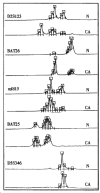Clinicopathological and molecular genetic analysis of 4 typical Chinese HNPCC families
- PMID: 11854906
- PMCID: PMC4695599
- DOI: 10.3748/wjg.v7.i6.805
Clinicopathological and molecular genetic analysis of 4 typical Chinese HNPCC families
Abstract
Aim: To study the clinicopathological and molecular genetic characteristics of typical Chinese hereditary nonpolyposis cotorectal cancer (HNPCC) families.
Methods: Four typical Chinese HNPCC families were analyzed using microdissection, microsatellite instability analysis, immunostaining of hMSH2 and hMLH1 proteins and direct DNA sequencing of hMSH2 and hMLH1 genes.
Results: All five tumor tissues of 4 probands from the 4 typical Chinese HNPCC families showed microsatellite instability at more than two loci (MSI-H or RER+ phenotype). Three out of the 4 cases lost hMSH2 protein expression and the other case showed no hMLH1 protein expression. Three pathological germline mutations (2 in hMSH2 and 1 in hMLH1), which had not been reported previously, were identified. The same mutations were also found in other affected members of two HNPCC families,respectively.
Conclusion: Typical Chinese HNPCC families showed relatively frequent germline mutation of mismatch repair genes. High-level microsatellite instability and loss of expression of mismatch repair genes correlated closely with germline mutation of mismatch repair genes. Microsatellite instability analysis and immunostaining of mismatch repair gene might serve as effective screening methods before direct DNA sequencing. It is necessary to establish clinical criteria and molecular diagnostic strategies more suitable for Chinese HNPCC families.
Figures







Similar articles
-
Clinicopathological and molecular genetic analysis of HNPCC in China.World J Gastroenterol. 2005 Mar 21;11(11):1673-9. doi: 10.3748/wjg.v11.i11.1673. World J Gastroenterol. 2005. PMID: 15786548 Free PMC article.
-
[Clinicopathological and molecular genetic analysis in Chinese typical hereditary nonpolyposis colorectal cancer pedigrees].Zhonghua Bing Li Xue Za Zhi. 2001 Oct;30(5):339-44. Zhonghua Bing Li Xue Za Zhi. 2001. PMID: 11769729 Chinese.
-
Clinical features and mismatch repair gene mutation screening in Chinese patients with hereditary nonpolyposis colorectal carcinoma.World J Gastroenterol. 2004 Sep 15;10(18):2647-51. doi: 10.3748/wjg.v10.i18.2647. World J Gastroenterol. 2004. PMID: 15309712 Free PMC article.
-
[Molecular cancer disposition diagnosis exemplified by colorectal carcinoma. What is the contribution of pathology?].Pathologe. 1998 Jul;19(4):269-78. doi: 10.1007/s002920050283. Pathologe. 1998. PMID: 9746911 Review. German.
-
Hereditary nonpolyposis colorectal cancer: diagnostic strategies and their implications.Evid Rep Technol Assess (Full Rep). 2007 May;(150):1-180. Evid Rep Technol Assess (Full Rep). 2007. PMID: 17764220 Free PMC article. Review.
Cited by
-
Silencing-specific methylation and single nucleotide polymorphism of hMLH1 promoter in gastric carcinomas.World J Gastroenterol. 2003 Jan;9(1):26-9. doi: 10.3748/wjg.v9.i1.26. World J Gastroenterol. 2003. PMID: 12508345 Free PMC article.
-
Germline mutation analysis of hPMS2 gene in Chinese families with hereditary nonpolyposis colorectal cancer.World J Gastroenterol. 2010 Aug 14;16(30):3847-52. doi: 10.3748/wjg.v16.i30.3847. World J Gastroenterol. 2010. PMID: 20698049 Free PMC article.
-
Nuclear and mitochondrial DNA microsatellite instability in hepatocellular carcinoma in Chinese.World J Gastroenterol. 2004 Feb 1;10(3):371-5. doi: 10.3748/wjg.v10.i3.371. World J Gastroenterol. 2004. PMID: 14760760 Free PMC article.
-
Arterial chemotherapy of 5-fluorouracil and mitomycin C in the treatment of liver metastases of colorectal cancer.World J Gastroenterol. 2002 Aug;8(4):663-7. doi: 10.3748/wjg.v8.i4.663. World J Gastroenterol. 2002. PMID: 12174375 Free PMC article.
-
Analysis for phenotype of HNPCC in China.World J Gastroenterol. 2002 Oct;8(5):837-40. doi: 10.3748/wjg.v8.i5.837. World J Gastroenterol. 2002. PMID: 12378626 Free PMC article.
References
-
- Anwar S, Hall C, White J, Deakin M, Farrell W, Elder JB. Hereditary non-polyposis colorectal cancer: an updated review. Eur J Surg Oncol. 2000;26:635–645. - PubMed
-
- Lynch HT, Lynch JF. Hereditary nonpolyposis colorectal cancer. Semin Surg Oncol. 2000;18:305–313. - PubMed
-
- Marra G, Boland CR. Hereditary nonpolyposis colorectal cancer: the syndrome, the genes, and historical perspectives. J Natl Cancer Inst. 1995;87:1114–1125. - PubMed
-
- Lynch HT, Smyrk T, Lynch JF. Molecular genetics and clinical-pathology features of hereditary nonpolyposis colorectal carcinoma (Lynch syndrome): historical journey from pedigree anecdote to molecular genetic confirmation. Oncology. 1998;55:103–108. - PubMed
-
- Lynch HT. Hereditary nonpolyposis colorectal cancer (HNPCC) Cytogenet Cell Genet. 1999;86:130–135. - PubMed
Publication types
MeSH terms
LinkOut - more resources
Full Text Sources

